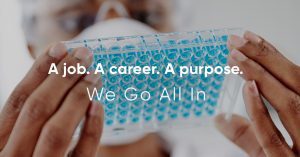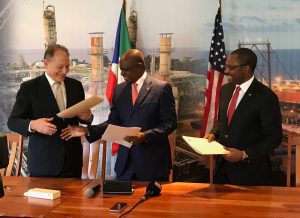
Diversity, Equity & Inclusion at Kite a Key Facet of Frederick Manufacturing Site’s Work Culture
Diversity, Equity & Inclusion, or DE&I, has been a buzzword in the biotech and biopharma industry over the last several years as big companies have attempted to reconcile a rampant lack of diversity within industry. Like with any relatively new movement, early efforts often begin with a lot of bark and very little bite.
One can see a parallel between early biotech DE&I and the earlier days of environmental impact awareness. Companies across industries talked of going green but produced little action or results. True environmentalists often deride this as “green wash” or using going green as a marketing tool rather than actually executing meaningful environmental best practices.
Similarly, the early DE&I days in life sciences expressed the correct sentiment but were more PR and marketing messages than anything else. Minorities were (and still are) underrepresented in biotech and biopharma and women have remained on the fringes of the C-suite and board rooms. A 2021 article by FierceBiotech noted that 7 in 10 biotechs listed DE&I as part of their value statements yet minorities and female representation in biotech as a whole and at the executive level have historically remained very low.
Today, DE&I programs across the life sciences are starting to find their bearings, aligning value statements and brand messaging with real, tangible and meaningful DE&I action.
One of the leaders in the DE&I biotech space has been Gilead, the parent company of Kite, which launched a robust, action-oriented DE&I initiative in 2019. Gilead and Kite have made concerted efforts to improve workplace culture for underrepresented groups; they currently have programs focused on advancing black leadership, developing diverse talent, building diversity representation goals, establishing pay equity, and working with its partners on DE&I efforts.
The tangible results of Gilead and Kite’s DE&I efforts are evident at Kite’s Frederick, Maryland manufacturing facility, which was just recently approved for commercial production by the U.S. Food & Drug Administration (FDA).
Kite’s Alexis Melendez, the Frederick site’s Senior Director of Facilities and Engineering, played a big role in this recent FDA approval milestone and has experienced firsthand how the company’s DE&I efforts are positively impacting an often underrepresented biotech worker segment: Spanish-speaking contractors and employees.
At Kite’s Frederick location, leadership has paid increased attention recently to its Spanish-speaking and bi-lingual employees as well as to recruiting more talent from Spanish-speaking communities in the Frederick County, Maryland community.
Melendez, who is originally from Puerto Rico, is a veteran of the region’s biotech industry, having had career stops at MedImmune and AstraZeneca; he also spent almost 15 years at Johnson & Johnson. He has not only been a witness to the BioHealth Capital Region’s (BHCR) growth into a global biohub, but he has also experienced the evolution of DE&I from non-existent in some cases to where it stands now at places like Gilead and Kite, as well as others who have made a real push for greater equity in biotech.
For Melendez, who certainly felt marginalized at various points in his career, DE&I was always a critical issue for him personally. Then, the construction process at the Frederick manufacturing site revealed once again how genuine, practical DE&I efforts can impact communities and lives.
“I was the second employee at this Frederick site. When we started this greenfield project, we noticed that many of our construction team members were Spanish-speaking. The site, in general, couldn’t always communicate with this team, but I could,” stated Melendez.
“This started happening more often and we knew the facility needed to be more bi-lingual. The issue we were confronting was safety and compliance; it wasn’t fair that some of our construction workers couldn’t understand the rules, and this created a safety risk for them and us. We needed to make it a priority that if you came to work here, you’d go safe back to your family,” he added.
Melendez and other team members developed warnings and safety compliance materials in Spanish to ensure that construction safety best practices and rules were easily understood by Spanish-speaking partners. The Kite Frederick team built a more inclusive safety culture not only within the site, but also with the various subcontracting companies involved in the greenfield build.
“It was interesting. Once the construction was completed, we thought these efforts would slow down but they didn’t. We started to look for our own workforce and much of the talent we needed happened to be Spanish-speaking people. So we were confronting the same challenges but now with more impact to our business because these hires were not independent contractors, they would be full-time employees,” stated Melendez.
Melendez approached and partnered with Kite’s human resources team to build DE&I programming around the Spanish-speaking community that was growing within Kite’s Frederick work culture. Ensuring that the Spanish-speaking Kite team members felt part of the facility’s culture became a key priority for Melendez, HR, and others involved in the site’s DE&I ecosystem.
“Inclusion is a core value at Gilead and Kite,” said Deedy DeLeon, Director, Human Resources at Kite. “Our goal is to be the employer of choice for diverse talent and to foster an inclusive culture where differences are respected and illuminated in order to innovate and enable Kite’s mission in helping people living with cancer.”
Gilead’s DE&I program includes Employee Resource Groups (ERGs). Current ERGs include GLOBE (Gilead Leadership of Black Employees), W@G (Women at Gilead), PRIDE Alliance, GVET (Gilead Veterans Engagement Team), GAIN (Gilead Asian Interest Network), and the GILEADOS (Latinos at Gilead Sciences).
Melendez sponsored the establishment of a GILEADOS local chapter at Kite’s Frederick site. This ERG brings important community topics to the forefront, including sharing food culture and discussing important community issues like immigration.
“We want to make sure we are being heard, that we are known. To make sure that people better understand our country and traditions,” Melendez shared.
Building a more inclusive culture for Spanish-speaking team members has also helped Kite recruit from this community.
“Gilead is at the forefront of DE&I. It is part of our DNA but people don’t seem to believe it at first. But when they get here, they say, ‘I’m speaking Spanish here? I’ve never been at a company where speaking Spanish is the norm’,” stated Melendez.
The inclusivity experienced by Spanish-speaking team members is a real work benefit and this aspect of Kite’s employer brand is an asset when it comes to hiring talent from the Spanish-speaking community.
“Even for myself this was eye-opening. It’s a huge benefit–being able to be who you are,” shared Melendez. “You feel included.”
“At Kite, I can strive without any fear of the words that I’m saying are seen through where I come from and not the knowledge I have. Kite is diverse; everyone is welcome here. The mission here is more important than anything else and that mission has become our common ground,” he added.
- About the Author
- Latest Posts
Steve brings nearly twenty years of experience in marketing and content creation to the WorkForce Genetics team. He loves writing engaging content and working with partners, companies, and individuals to share their unique stories and showcase their work. Steve holds a BA in English from Providence College and an MA in American Literature from Montclair State University. He lives in Frederick, Maryland with his wife, two sons, and the family dog.




